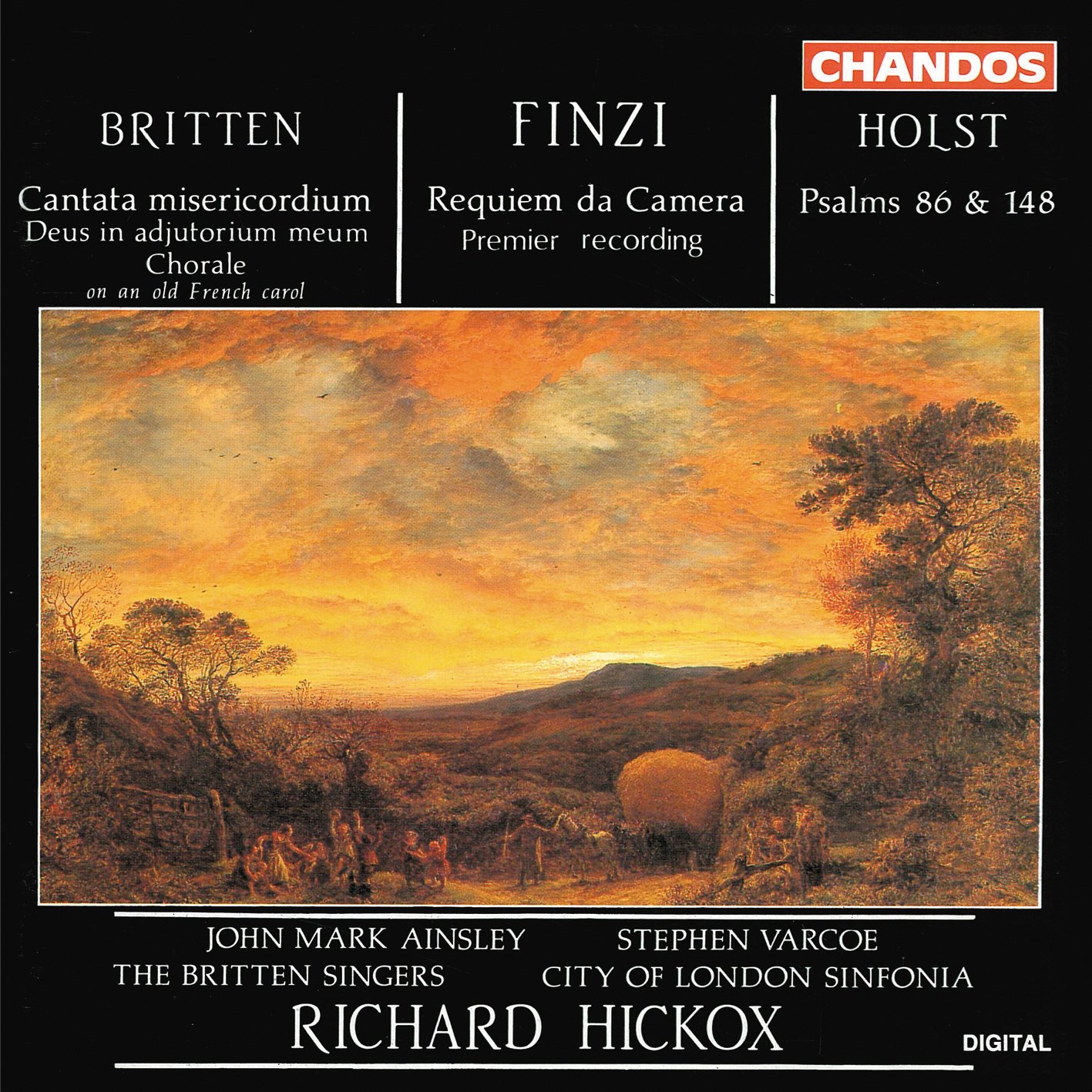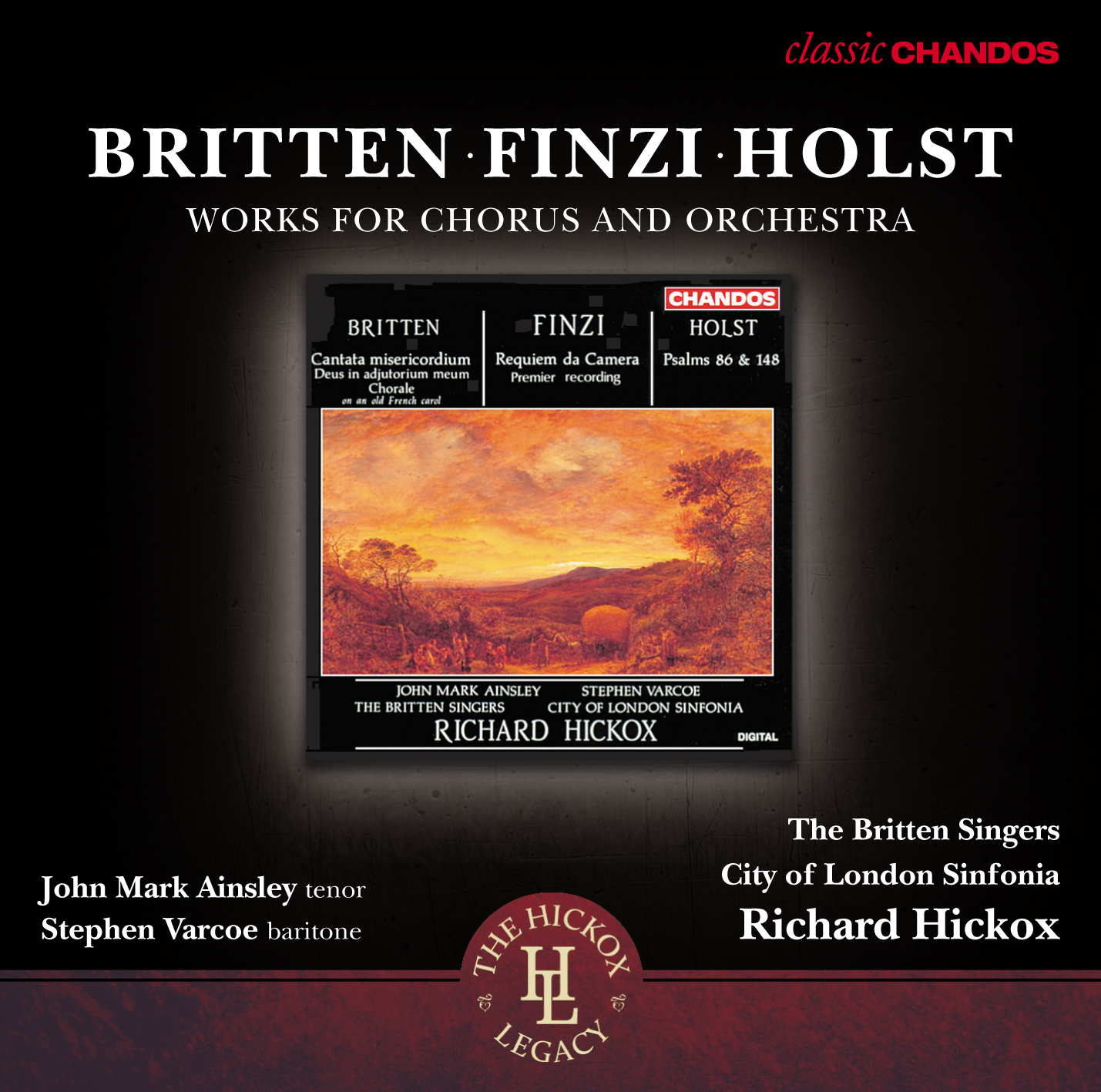How Have I Lost Track of These?
I used to see this recording in the catalogs all the time, yet I never bit the bullet and purchased it.
Well, here I am nearly 35 years later finally getting around to hearing this recording.
Overall, this program of choral works from Benjamin Britten, Gerald Finzi, and Gustav Holst is contemplative and introspective.
This is especially true of Finzi's Requiem da Camera, whose pastoral Requiem setting is far from that of Britten or Hindemith, laying closer to the musical setting from Howells, at least to offer a sense of style. Musically, for who could argue with Finzi's personal feelings of loss, I could use a little more variety across its four movements. Yet, this music is beautiful, if not a bit searching in its mood and structure.
After a lengthy orchestral prelude, an a cappella chorus intones in an early-20th Century manner. The solo winds really make this work sound plaintive, featured throughout the nearly 25-minute runtime, and an organ bolsters the bass line from time to time as well. The texts are focused home-bound rather than abroad, lending a personalized atmosphere to the music.
The last two movements feature solo vocals, where baritone Stephen Varcoe is particularly lovely in his movement.
So it is with Britten's Cantata Misericordium as well, with the added element of the composer's special brand of modernism. The Latin text puts a bit of distance between the listener and the music, although I haven't found this a problem in some of his other works. I find the music here rather dreary too, almost menacing at times, all of which I suppose is presaged by the Misericordium title.
While the cantata is only 20 minutes, this work is still a bit of a tough nut. Like Finzi's Requiem, there is an understated, searching quality to Britten's cantata, but here with music not necessarily concerned with resolution, either musically or emotionally. The dank moodiness comes from light dissonance throughout, some incisive rhythmic qualities, aside austere vocal settings, all lending a Stravinsky-ian vibe. While I appreciate Britten's unique approach to each of his cantatas, this one will take some further work from me for a greater appreciation.
It should be noted, Britten himself led his Cantata Misericordium with Fischer-Dieskau and Peter Pears as soloists and the London Symphony Orchestra and Chorus on Decca. Collectors will want that recording as well. ADDENDUM: I gave a listen to Britten's recording some time after posting (BLOG). I was immediately hooked by his performance, so I would probably start there to get a hang of this cantata.
As a bit of a bonus, the two shorter a cappella motets from Britten follow in the style of the composer's Hymn to St. Cecilia. I find them much more affable and interesting, at least compared to the cantata at hand, a rare reaction from me regarding a wonderfully vivid set of cantatas from the pen of Britten.
The rhythmic contrasts in Deus in Adjutorium Meum are its greatest attribute, for Britten never tires the listener with one prolongated idea, where the composer prefers approachable complexity. I don't know the titular French Carol in Britten's Chorale, but it is perhaps an even more beautiful a cappella choral setting than Deus, reaching towards a direct, clear Palestrina-ian style.
The Two Psalms from Holst are also rather engaging, also of rather short measure, with the bonus of an orchestration afforded them. Psalm 86 has an ancient quality to its a cappella portions, while the strings mostly provide interlude-type portions, bringing the music into the 20th Century, while the soloist, pipe organ, and responsorial chorus hearken to religious tradition. I know the tune Holst sets to the words of Psalm 148 as the hymn Ye Watchers and Ye Holy Ones, which Holst turns into a tuneful choral fantasia.
The Richard Hickox Legacy series on Chandos intimates a remastering on their reissue, but for a Classical Music label prized for their fine sonics, I wonder what was needed. In any case, these performers are all of fine quality throughout the recording.
Works
Requiem da Camera (23.42)
Cantata Misericordium (19.39)
Two Psalms (13.22)
Psalm 86 (8.23)
Psalm 148 (5.00)
Deus in Adjutorium (5.16)
Chorale after an Old French Carol (5.01)
Soloists
Alison Barlow, soprano
John Mark Ainsley, tenor
David Hoult, baritone
Stephen Varcoe, baritone
Performers
John Alley, organ
Britten Singers
City of London Sinfonia
Richard Hickox, conductor
Label: Chandos
Year: 1991; 2013
Total Timing: 67.37
I am going to have to work on the larger works from Finzi and Britten for greater appreciation by this listener.
On the other hand, I can't complain about these performances, brought out by Chandos' fine sonics.




Comments
Post a Comment